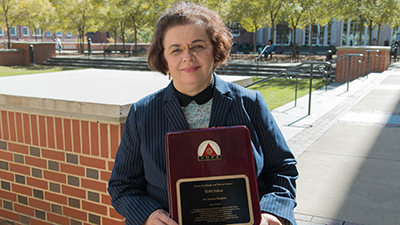NSF appoints CSSE faculty member to serve on EPSCoR committee
Published: Jul 29, 2021 8:00 AM
By Joe McAdory
Daniela Marghitu has an opportunity to make an impact in research and academic funding for financially disadvantaged states and underrepresented groups within academia.
Marghitu, a long-time faculty member in the department of computer science and software at the Samuel Ginn College of Engineering, has been appointed by the National Science Foundation (NSF) to its Committee on the Future of NSF’s Established Program to Stimulate Competitive Research (EPSCoR). Twenty-seven states and the U.S. Virgin Islands were identified by EPSCoR as areas of need in terms of strengthening STEM capacity and capability. Alabama is one of them.
“I love Alabama and there are many hard-working people here who live below the poverty line,” said Marghitu, who has also served for the past six years on NSF’s Committee on Equal Opportunities in Science and Engineering. “There are many children with academic and professional potential, but do not have the opportunities to maximize their potential, and that breaks my heart.”
EPSCoR is designed to help give them a better chance. For example, Alabama’s EPSCoR consortium alone has been awarded $167 million through 265 federal grants since 2009.
The NSF EPSCoR committee will play a critical role in guiding the governing body’s visioning process by engaging with its external stakeholder community to better understand the impacts of its investment strategies, identifying new opportunities for increased success, and developing recommendations for funding.
NSF and EPSCoR will help by:
- Catalyzing research capability across and among jurisdictions
- Establishing STEM professional development pathways
- Broadening participation of diverse groups/institutions in STEM
- Effect management in STEM at national and global levels
- Impact jurisdictional economic development
“We must better evaluate what already exists in terms of needs for the EPSCoR states, so when there is new solicitation, the solicitation will accurately reflect the needs,” Marghitu added.
“The needs are often technology-related. There are not enough computers, resources for education, training, and of course, affordability. We also need more funding for scholarships, whether it’s four-year schools or junior colleges, and there can be a stronger partnership between the EPSCoR states, corporations and local governments.”
As part of the NSF EPSCoR Committee, Marghitu will work with colleagues to best identify EPSCoR’s investment strategies in order to advance jurisdiction-wide solutions and best practices in order to achieve the program’s goals, and pinpoint strategies that best enables NSF EPSCoR and its partners to succeed.
“This is a tremendous opportunity for Dr. Marghitu, who has a history of representing the department, college, and Auburn on important NSF committees,” said Hari Narayanan, chair of the college’s department of computer science and software engineering. “I’m excited that she will be able to help identify new ways for NSF to support and enhance the STEM research and education infrastructure in states like Alabama, which can ultimately translate into improved economic opportunities for their citizens.”
Media Contact: , jem0040@auburn.edu, 334.844.3447
Daniela Marghitu also serves on NSF's Committee on Equal Opportunities in Science and Engineering.

